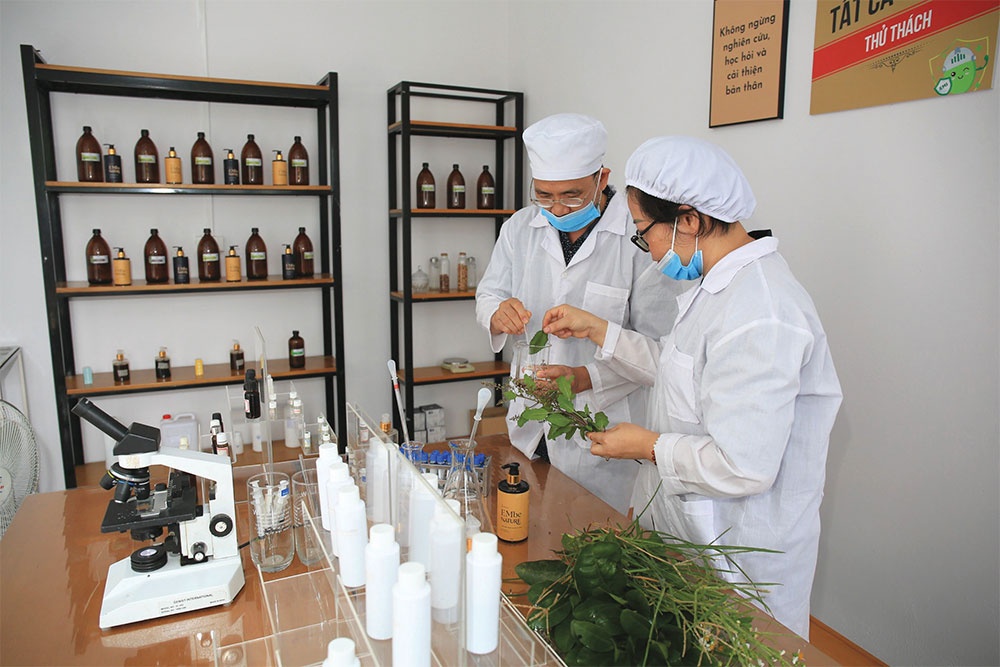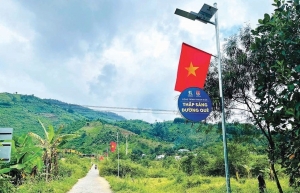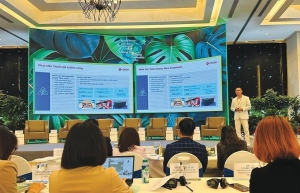Predictability and incentives among sustainability factors
 |
| Companies are looking to implement more green initiatives so they can expand their operations, Photo: Pham Hoang Van |
A plan from agricultural manufacturer and service supplier Loc Troi Group to establish carbon credits has been submitted for evaluation and appraisal, with results expected by the end of 2023.
“The group’s main goal is to establish carbon credits for rice exports to the European and US markets. When carbon tax regulations take effect in 2025 in these countries, green production records are a great advantage in export competition,” said Nguyen Duy Thuan, general director of Loc Troi Group, at VIR’s November 16 event on sustainability.
A trading and profit sharing mechanism has been predetermined by the group. Around 30 per cent of the proceeds from the sale of 100 carbon credits will be spent to pay taxes to the state, and the remaining 70 per cent will be transferred back to farmers.
Developing the rice industry to adapt to climate change and reduce emissions is necessary, Thuan said. “This goes along with improving the competitiveness of Vietnamese rice in the world market. We talk about this a lot, but have not created motivation for businesses to transform,” Thuan noted.
“Penalties and rewards are two ways to create motivation for businesses to transform to green, but must be done at the same time to be effective. If we only penalise businesses with large emissions, they will find a loophole, while rewarding low-emitting businesses is meaningless when they already have abundant financial conditions,” he added.
According to Thuan, the situation will change when farmers have more income from selling carbon certificates, this will become a new driving force for businesses when products meet green standards of international organisations.
“However, enterprises are in dire need of an organisation that determines emission levels for each industry and issues emission standard certificates recognised by Vietnam and internationally,” he said.
The EU stipulates that a project cannot issue carbon certificates and receive payments unless it demonstrates measurable and verifiable results by a third party in reducing or abating emissions. New regulations also clarify the methodology and scope of climate action projects, the latest being the EU’s Carbon Border Adjustment Mechanism, effective from last month.
At last week’s conference, the importance of green transformation was identified in the plans of homecare, health, and beauty company EMcom.
“Choosing a small-step option can help the company bring sustainable values, in the context of climate change and emissions that are directly affecting the Vietnamese people,” said Bui Bich Lien, director of EMcom JSC. “When business owners are aware and dedicated to sustainable values, they will find ways to steer their businesses and overcome current challenges.”
Declining sales and profits also lead to frustration among workers, while the green transformation roadmap does not bring results quickly, Lien added.
EMcom’s strength is offering products that can support customers in protecting their bodies. Many Vietnamese users want to see immediate results when using a product, but want to limit their spending.
“They almost ignore the perceived value for future health. This is similar to the story of green transformation of businesses. Focusing on short-term goals can ignore sustainable values, values that can cause imbalance, and affect the sustainable development of businesses,” Lien said.
The green transformation process will not have a general formula suitable for all businesses, but depends on many different factors such as the size, field, location, and culture of each type of business.
In the general trend of sustainable development, the Korean Chamber of Business in Vietnam is keen to join the government in promoting green transformation in Vietnam. Chairman Hong Sun said that this year there are now around 10,000 South Korean enterprises producing and doing business in Vietnam. “For many years, South Korean businesses have implemented many greening projects along with the process of investing in production and business in Vietnam,” Sun said. “Companies in the high-tech sector, such as Samsung or LG, have developed green and clean production, meeting global green standards. They also invest heavily in technology, as well as rooftop solar energy systems, to minimise emissions.”
Industrial manufacturing companies, such as in textiles and footwear, also follow this trend. Hansae, a South Korean garment production chain, with sales in Vietnam of about $1 billion a year since 2021, launched a recycled fabric project last year. This was the first of many initiatives for the textile industry in moving towards green production, meeting increasing requirements from European importers and many other markets. “Vietnam is promoting the green transformation roadmap, but businesses will not simply invest because of good communication,” Sun said. “Businesses need attractive incentives and predictable results. Therefore, green transformation in Vietnam must create potential profits for businesses to dare to invest.”
Momentum can still be created if the Vietnamese government further simplifies administrative procedures and sharply reduces taxes for low-emission businesses. These moves will support businesses to invest more strongly, contributing to Vietnam’s green transformation process, Sun added.
 | AEON committed to more sustainable consumption The rental of shopping bags and utilising supporting partners to participate in green transformation are just some of AEON Vietnam’s initiatives to promote sustainable consumption. Nguyen Thi Ngoc Hue, corporate communications and external affairs general manager of AEON Vietnam, discussed the company’s green journey with VIR’s Oanh Do. |
 | Only the best for SABECO’s sustainability direction Following the trends of sustainable development in the Vietnam and around the world, Saigon Beer-Alcohol-Beverage Corporation, known as SABECO, is implementing related targets and campaigns not only for the business but also for the whole of society. |
 | DKSH’s sustainability strategy gives operations deeper value Following the values of its parent company, DKSH Vietnam promotes sustainable responsibilities related to business activities. |
What the stars mean:
★ Poor ★ ★ Promising ★★★ Good ★★★★ Very good ★★★★★ Exceptional
Related Contents
Latest News
More News
- State corporations poised to drive 2026 growth (February 03, 2026 | 13:58)
- Why high-tech talent will define Vietnam’s growth (February 02, 2026 | 10:47)
- FMCG resilience amid varying storms (February 02, 2026 | 10:00)
- Customs reforms strengthen business confidence, support trade growth (February 01, 2026 | 08:20)
- Vietnam and US to launch sixth trade negotiation round (January 30, 2026 | 15:19)
- Digital publishing emerges as key growth driver in Vietnam (January 30, 2026 | 10:59)
- EVN signs key contract for Tri An hydropower expansion (January 30, 2026 | 10:57)
- Vietnam to lead trade growth in ASEAN (January 29, 2026 | 15:08)
- Carlsberg Vietnam delivers Lunar New Year support in central region (January 28, 2026 | 17:19)
- TikTok penalised $35,000 in Vietnam for consumer protection violations (January 28, 2026 | 17:15)

 Tag:
Tag:


















 Mobile Version
Mobile Version